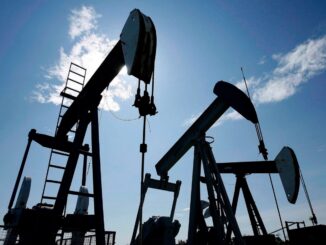
Daily Standup Top Stories
Houthis fire their greatest barrage of weapons to date in the ongoing Red Sea shipping crisis
The Houthis launched their largest attack so far yesterday evening. According to the US military the “complex attack” consisted of 18 attack drones, two anti-ship cruise missiles, and one anti-ship ballistic missile. They were all […]
Rising Shipping Costs Will Impact Oil and LNG
The Red Sea facilitates approximately 12 percent of global trade, including 30 percent of global container traffic. Shipping times vary by the size of the vessel, but large container vessels take approximately 25 days to […]
Russia announces 30 new member countries for BRICS
The geopolitical landscape is witnessing a seismic shift as Russia declares that 30 additional countries are poised to join the BRICS alliance, potentially expanding its membership to a formidable 40 nations. This move, championed by Russia’s President […]
Oil, Gas Lobby Group Warns Against US Slowing Down LNG Approvals
By Laura Sanicola and Valerie Volcovici WASHINGTON (Reuters) -The head of the main U.S. oil and gas lobby group on Wednesday said that if U.S. regulators slow down or stop approving liquefied natural gas exports, […]
Oil, Gas Lobby Group Warns Against US Slowing Down LNG Approvals
By Laura Sanicola and Valerie Volcovici WASHINGTON (Reuters) -The head of the main U.S. oil and gas lobby group on Wednesday said that if U.S. regulators slow down or stop approving liquefied natural gas exports, […]
Highlights of the Podcast
00:00 – Intro
01:32 – Houthis fire their greatest barrage of weapons to date in the ongoing Red Sea shipping crisis
03:16 – Rising Shipping Costs Will Impact Oil and LNG
04:59 – Russia announces 30 new member countries for BRICS
05:54 – Oil, Gas Lobby Group Warns Against US Slowing Down LNG Approvals
07:47 – Energy Absurdity in Germany: Cutting Emissions Through Economic Collapse
09:07 – Outro
Follow Stuart On LinkedIn and Twitter
Follow Michael On LinkedIn and Twitter
– Get in Contact With The Show –
Video Transcription edited for grammar. We disavow any errors unless they make us look better or smarter.
Stuart Turley: [00:00:14] Hello, everybody. Welcome to the Energy News Beat podcast. My name’s Stu Turley president, CEO of the sandstone Group. This is the daily stand up for January 11th, uh, 2024. I’ll tell you what. The time is flying. We’ve got an action packed discussion today. Hoodies fire their greatest barrage of weapons to date on the ongoing sea Red sea shipping crisis. What’s going to happen? Their shipping costs will be in packaging. Hugely. Russia announces. Are you ready? Announces to its 30 new member countries for BRICs. Wow. Uh, oil and gas lobby warns against us slowing down of LNG approvals. This is actually pretty frightening as we’re seeing what the administration is doing with some really silly decisions. Energy, absurdity and Germany cutting emissions through economic collapse. This is related to that first story. Regulatory actions, um, actually could backfire in the both economies, Germany and the US. [00:01:31][77.2]
Stuart Turley: [00:01:32] Let’s go with the who these first fire their, uh, greatest barrage of weapons to the ongoing Red sea shipping crisis. This is actually frightening when you sit back and take a look at it. Let’s see. The military complex attack consisted of 18 ad tech drones and two anti-ship cruise missiles. One anti-ship ballistic missile. Wow. They were all shot down by F-18 aircraft from the, uh, Dwight balls in the air, uh, aircraft carrier, three destroyers and one British destroyer. That’s amazing. But you know what the sad part is? Uh, let’s see. A $20,000 drone versus, uh, a couple million dollar armament against it. So, yeah, it’s pretty amazing, eh? Let’s see. Not only fuel cost emissions are higher for a cape, uh, voyage, but there’s an additional cost with a newly introduced emissions trading scheme from the EU. A ship leaving, uh, Colombo and Sri Lanka, uh, for Barcelona, would be liable for twice the amount of carbon credits if transferred, transitioning via the Cape rather than Suez Canal, corresponding to an additional $82,000 per container ship. [00:02:58][85.8]
Stuart Turley: [00:02:59] That’s just amazing. Uh, you sit back and take a look at carbon tax. It’s just a tax for the wealthy so they can redistribute and, uh, put it into funds and then move it around wherever they want. The, uh, this the other article also addresses this as well. Rising shipping costs will impact oil and LNG, not only just the shipping cost that you, uh, heard me talk about approximately 8.2 million barrels per day of crude, uh, go through the Red sea, uh, between January and November 2023. That’s a ton. And you sit back and take a look at S&P global, uh, commodity, 16.2 million metric tons, accounting for 51% of all LNG trade has been shipped east through the Suez Canal. This is going to be an awful lot. So you sit back and think about the Who. These are not helping out ESG at all. So who these are definitely against ESG and they’re not good for the, uh environment. So not only will this impact oil and LNG, those costs are going to get embedded back into that price. And you, the consumer, are going to be, uh, tagged with the price of a shipping container from East Asia to the Mediterranean has ridden by 44% from December 2023, 44% per container. Uh, talk about some inflation. So it’s amazing what, uh, terrorism will do. Uh, just it is just amazing. So as we take a look at that, you’ve got the hoodies firing, you’ve got the shipping costs, uh, covering, but they’re related because the carbon tax is also having to be charged on longer voyages. [00:04:58][118.8]
Stuart Turley: [00:04:59] This part is really kind of wild when you say Russia announces 30 new member countries for BRICs. Wow. BRICs started out with Brazil, Russia, India, China and South Africa and it is expanding out. It is going to be well over half the population of the world. Before too long at all. This is a huge financial, uh, agreement between these countries. Uh, it is going to take the U.S. dollar down. People are saying it’s not going to happen soon. I think it’s going to happen sooner than later based off of our geopolitical issues. Take a look at this one. Putin being the president. It’s going to be pretty interesting. He’s the president of BRICs this year along this same story thread. Oil and gas lobby groups warns against U.S. slowing down uh, LNG approvals. This part is really kind of sad. And it’s sold into the ESG portion and the carbon credits. This is halting U.S. LNG approvals would put our allies at risk. This would not be, uh, this should not be controversial, summers said in an API event. Uh, focused on top issues. Uh, uh, the head of the API. So if you sit back and think, uh, we are really helping replace Russian, uh, natural gas. Germany has that I’m going to talk about in this next one has suffered because of the lack of natural gas. And it’s wiped out their their businesses, their economy. Um, the Biden administration is prompting, uh, the the main, uh, oil and gas. The Department of Energy is leading an effort to determine whether federal regulators should factor in climate change considerations, whether to decide proposed gas port export project meets the national talk about legislation through regulatory actions. And this is despicable. Um, I’m all in on good regulations. I am all in on being able to take care of the environment. But what you’re going to do is you’re going to be harming other people all the way around the world, and you’re going to actually cause more damage to the environment by then, not having an actual open discussion about it. [00:07:44][165.0]
Stuart Turley: [00:07:44] It’s very, very sad. And here’s why. Energy absurdity in Germany cutting emissions through economic collapse. This is really a very important, uh, point that, uh, David Blackman brought out beyond, uh, Lombard pointed out Germans are now consuming less electricity per capita than they did in 1978. This graph, uh, this producer, if you can pull this in, you can see that in 1978, it was about 651, 680 watch per um citizen. Here’s where the reason that it’s come down is because it’s too expensive for them to do anything. And so when you take a look at the loss of businesses that have shut down the fact that everybody is having to turn the heat way down, their, uh, energy consumption is down. So are their emissions. But they’re going into a recession. And I’ve heard the depression word instead of providing low cost energy, they are absolutely destroying their economy. I thought the comment was was right on. Is it on purpose? Uh. Or is it stupidity? Uh, I’m not sure. I’m going to let you all decide on that one. [00:09:06][81.4]
Stuart Turley: [00:09:07] If you have any. Comments or suggestions, please let us know if you’re an industry thought leader. If you’re a CEO of an energy company, I want to talk to you. So thank you and sign. Subscribe. Tell your friends, tell your pets, and uh, look forward to seeing you again soon. Thanks. [00:09:07][0.0][528.2]



